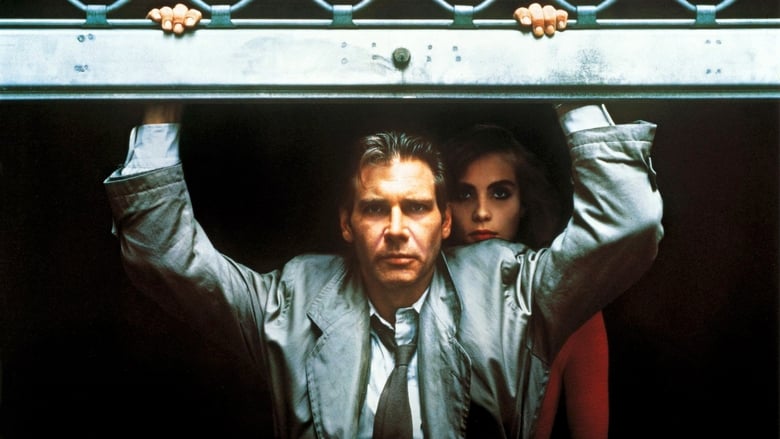← Back to Reviews

in
#716 - Frantic
Roman Polanski, 1988

An American doctor and his wife go on a business trip to Paris, but when she gets kidnapped he becomes embroiled in a dangerous conspiracy.
Masters don't become masters without reason, so it would seem a little disingenuous of me to automatically dismiss any film because its director owed perhaps a little too much to the standards of a filmmaker with an unquestionable critical reputation. That being said, Roman Polanski's Frantic owes more than a little debt to the works of Alfred Hitchcock. The plot certainly seems like vintage Hitch as it follows an American doctor (Harrison Ford) arriving in Paris with his wife (Betty Buckley) as part of a business trip. After they check into their hotel room and find that Buckley's got the wrong suitcase, she suddenly goes missing without explanation. Ford's understandably...frantic search for her soon leads him into Paris's seedy underbelly as he gets caught up in a struggle involving a highly-prized MacGuffin and a number of villainous, untrustworthy players who will stop at nothing to get their hands on what's in that suitcase. When the police naturally don't prove effective enough to help him, he takes things into his own hands and is forced to co-operate with a self-centred young woman (Emmanuelle Seigner) who is part of the conspiracy and proves a difficult ally in Ford's search for his wife.
The problem with Frantic is that it just doesn't do too much of note despite the apparent pedigree of its director and star. Granted, there's a certain grittiness to the film as it sends its cocksure protagonist way out of his depth and does go some way to challenge Ford's reputation as a capable hero while giving him some range (the scene late in the film where he makes a phone call to his unassuming kids is a stand-out). The film also tries to provide a good foil for him in the form of Seigner's low-level crook who follows a recognisable arc as she goes from a selfish desire to be paid for her smuggling to genuinely wanting to help Ford out. Unfortunately, the plot is too thin and familiar to truly sustain a film of this length and, while there's a certain interest in seeing how things turn out, the whole thing plods an awful lot for what is supposed to be a high-tension thriller. In trying to update all the classic Hitchcock motifs - the wrong man, the MacGuffin, the unlikely yet heavily charged alliance between a male and female lead, etc. - Polanski seems to unintentionally expose their hollow nature without offering much in the way of modern innovation. Instead, the only difference that the '80s setting really makes to this film is through Ennio Morricone's uncharacteristically bland and dated-sounding background score.
Roman Polanski, 1988

An American doctor and his wife go on a business trip to Paris, but when she gets kidnapped he becomes embroiled in a dangerous conspiracy.
Masters don't become masters without reason, so it would seem a little disingenuous of me to automatically dismiss any film because its director owed perhaps a little too much to the standards of a filmmaker with an unquestionable critical reputation. That being said, Roman Polanski's Frantic owes more than a little debt to the works of Alfred Hitchcock. The plot certainly seems like vintage Hitch as it follows an American doctor (Harrison Ford) arriving in Paris with his wife (Betty Buckley) as part of a business trip. After they check into their hotel room and find that Buckley's got the wrong suitcase, she suddenly goes missing without explanation. Ford's understandably...frantic search for her soon leads him into Paris's seedy underbelly as he gets caught up in a struggle involving a highly-prized MacGuffin and a number of villainous, untrustworthy players who will stop at nothing to get their hands on what's in that suitcase. When the police naturally don't prove effective enough to help him, he takes things into his own hands and is forced to co-operate with a self-centred young woman (Emmanuelle Seigner) who is part of the conspiracy and proves a difficult ally in Ford's search for his wife.
The problem with Frantic is that it just doesn't do too much of note despite the apparent pedigree of its director and star. Granted, there's a certain grittiness to the film as it sends its cocksure protagonist way out of his depth and does go some way to challenge Ford's reputation as a capable hero while giving him some range (the scene late in the film where he makes a phone call to his unassuming kids is a stand-out). The film also tries to provide a good foil for him in the form of Seigner's low-level crook who follows a recognisable arc as she goes from a selfish desire to be paid for her smuggling to genuinely wanting to help Ford out. Unfortunately, the plot is too thin and familiar to truly sustain a film of this length and, while there's a certain interest in seeing how things turn out, the whole thing plods an awful lot for what is supposed to be a high-tension thriller. In trying to update all the classic Hitchcock motifs - the wrong man, the MacGuffin, the unlikely yet heavily charged alliance between a male and female lead, etc. - Polanski seems to unintentionally expose their hollow nature without offering much in the way of modern innovation. Instead, the only difference that the '80s setting really makes to this film is through Ennio Morricone's uncharacteristically bland and dated-sounding background score.
